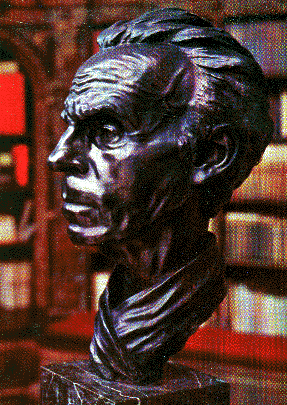
Bronze portrait of Louis-Ferdinand Celine, by Arno Breker

Bronze portrait of Louis-Ferdinand Celine, by Arno Breker
In the year 1940, I made the acquaintance of Louis-Ferdinand Celine in Paris at the German Institute. At that time he was considered among the most important writers of France. I knew his literary work; he, my sculptural work.
Celine was one of those who, notwithstanding existing differences between France and Germany, loved and understood my homeland. "The ultimate reconciliation and cooperation of our two countries--those are the things that matter most," he said to me during our first meeting.
The desire to do his portrait seized me at once. His facial features, strongly pronounced and enlivened, fascinated me. There was a physical peculiarity about him; this was the discrepancy between the volume of his head and the leanness of his neck, which was emanciated. A discrepancy which I wanted to make up for by means of a neck scarf, just as he always wore toward the end of his life.
Before the war I found Celine to be very elegant. And only afterward did he assume the behavior of a Bohemian of the 19th century. As everyone knows, he was surrounded by a number of cats and dogs and occupied in Meudon a large building that had already begun to decay a little. I visited him there one more time shortly before his death in 1961.
The atmosphere of his apartment was typically French. The furniture and objects that were around him, in their permanent appearance, had seemed for decades to be torpid and immovable. Dust and the patina of time began to cover them with a strange stillness.
On this afternoon Celine took a long look into my eyes, spoke very little, and really seemed to have said everything he had to say in his books. The few words he did say concerned human existence, its stay on earth, and eternity.
As I was leaving, Celine said to me, "This is not 'goodbye'! We shall remain." Taking his hand, I answered him full of emotion, "My dear, my great friend, so be it."
May we recommend some books?
Rigadoon, by Louis Ferdinand Celine
North, by Louis Ferdinand Celine
Eumeswil, by Ernst Jünger
Primer for Those Who Would Govern, by Hermann Oberth
Arno Breker: The Divine Beauty in Art, by B. John Zavrel
Alexander the Great, by Robin Lane Fox